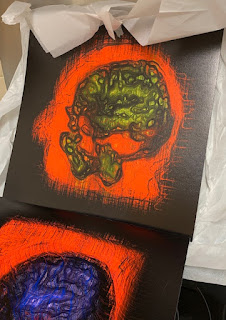I have a
diagnosis of Parkinson's Disease and although I have mostly mild symptoms at
present (controlled by medication) they are already impacting on my ability to
continue with my current creative work. I am adapting or adopting new ways of
working so that I can continue creative pursuits. This means less hand skills
and more digital/mechanical solutions.
Below you
will find my current thinking and output and some examples of change explained.
My website will eventually be restructured and revised to reflect these work
alterations.
On a
photography course I attended some time back at Westminster Uni., we
investigated whether an ethics approach to photography was appropriate in all
cases. In amongst the subjects we looked at was the experimental work
undertaken and recorded photographically, in the Victorian period. One such
series of photographs were the experiments by Duchenne in France. Little did I
realise, at the time the relevance of the experiments, to me and my
understanding of some of the symptoms that may worsen in my Parkinson’s as it
progresses.
So some of
the images I am currently working on reflect some of the writings of Duchenne
and his investigations into expression or more poignantly, the lack of in the
face of those with various neurological conditions. My initial, suspected,
diagnosis was based on a hint of facial masking. It is this aspect of Parkinson’s I am trying
to express in one series of images I am creating.
The first
series has been taken from MRI images of my brain and in these I try to express
the beauty of the brain, its complexity and to maybe observe these aspects in a
different form to the bland medical imagery. These images become a different
kind of portrait series that may alter perceptions of ‘selfies’ in that they
explore the inner rather than an outer image or projection of self commonly
posted on social media. These explorations are in one sense deeply personal and
help me to come to terms with my present and future. The viewer may well see
them differently and I hope will respond to the aesthetics rather than the 'medical'
of the images presented. The works of Barthes, on photography (e.g. Camera
Lucida), is probably relevant to these and other images that follow but textual
comparisons/analysis may be complicated when both the photographer and subject are
the same. Also digital photography is used making it possible for the image to be fluid over time rather than frozen in time.
The masking
series presents a more visceral approach to emotional expression and need to be
observed in this context. I have included some images showing one direction I
have been working on, more will follow.
I have
recorded as many facial expressions that I can immediately muster as a reminder
of what I may not be able to do so well later as a reminder to others that an
expressionless face and voice may offer no assistance in interpreting language.
Many of us may have experienced this during the current period where the
physical mask, to prevent infection, also prevents reading facial expression.
Facial expression is important in fully understanding how the same words may hold
a different meaning if this part of context is missing.
Anyway
enough words here are a couple of images including one piece of turning/CNC
taken from an MRI image. Some reference links for Duchenne. Barthes and image
on social media are to be found below.
Bowl form from brain scan
MRI Series
Masking Series
Duchenne:
https://en.wikipedia.org/wiki/Duchenne_de_Boulogne
https://en.wikipedia.org/wiki/Smile#Duchenne_smile
https://www.google.com/search?q=duchenne+research+images+getty+museum&source=lmns&bih=625&biw=1366&rlz=1C1CHWA_enGB622GB622&hl=en&sa=X&ved=2ahUKEwi8jNiRnN3tAhUxgM4BHaTCCVkQ_AUoAHoECAEQAA
Barthes:
https://mitphoto2016.wordpress.com/2016/04/29/a-not-so-short-summary-of-camera-lucida/
https://blogs.gre.ac.uk/andrewking/2013/03/07/roland-barthes-camera-lucida-a-study-guide-before-reading-the-text/
MRI:
https://www.wikihow.com/Read-an-MRI
Social Media
https://childmind.org/article/social-media-and-self-doubt/
https://www.researchgate.net/profile/Erin_Vogel3/publication/275507421_Social_comparison_social_media_and_self-esteem/links/55c2b71108aeb975673e47f6/Social-comparison-social-media-and-self-esteem.pdf



































